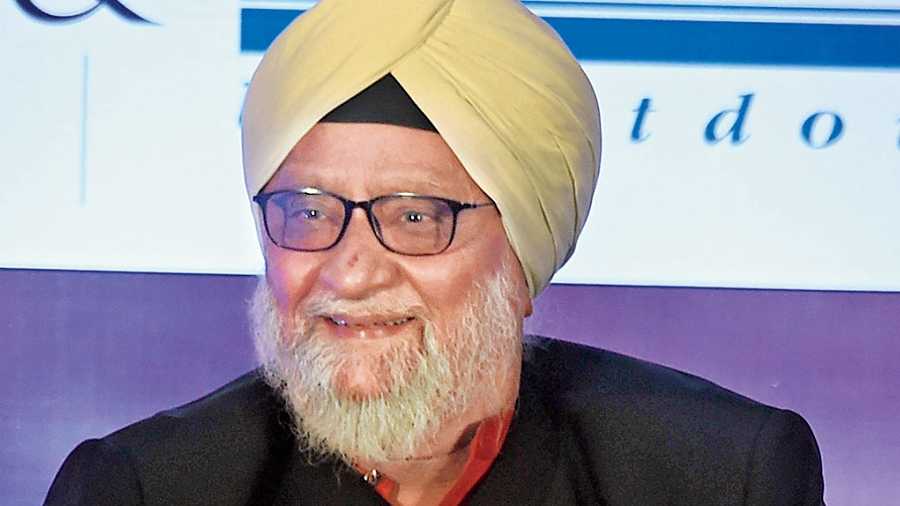Bishan Bedi, India's legendary spinner, dies at 77
Former India captain Bishan Bedi has died at the age of 77 in Delhi.
Bedi was ailing for the last two years and had undergone multiple surgeries including one on the knee about a month ago. He is survived by his wife Anju, their daughter Neha and son Angad, and his son Gavasinder and daughter Gillinder from his earlier marriage to Glenith Miles.
One of the game's most noteworthy left-arm spinners, Bedi addressed India in 67 Tests and ten ODIs from 1967 to 1979. He was India's most noteworthy wicket-taker in Tests, with 266 at a normal of 28.71, at the hour of his retirement. Bedi, the unconventional legspinner Bhagwath Chandrasekhar, and offspinners Erapalli Prasanna and Srinivas Venkataraghavan made up the praised turn group of four that overwhelmed Indian cricket during the 1970s.
Outside his accomplishments in Indian cricket, Bedi likewise partook in a fruitful vocation in the Region Title with Northamptonshire, for whom he took 434 five star wickets at 20.89.
"Miserable news to be sure," the previous India commander Sunil Gavaskar, Bedi's partner in 44 Test matches, said. "He was the best left-hand bowler that I saw."
As a bowler, Bedi was an expert's joy, famous for the old style magnificence of his activity and his capacity to keep an ideal length over lengthy spells while unobtrusively shifting his speed, direction and delivery.
"Like most extraordinary bowlers, his variety was unpretentious," the Britain commander Mike Brearley composed of him. "Of the relative multitude of slow bowlers of Bedi's time, none constrained you to commit yourself later than he. With little, somewhat late changes of wrist and hand-point, he could bowl progressive balls that seemed to be indistinguishable, maybe as though each would arrive on a length right external off stump.
"In any case, with the principal he would rooster his wrist more, convey the ball somewhat higher - it would turn strongly, remain more extensive of off, and be more limited than you expected. The following ball, very somewhat undercut and a little faster, would contribute further up and come towards center and leg stumps. To the primary ball you were probably going to play inside the line, and away from the body; to the second, outside the line, and round your front leg, so there was a gamble of inside edge on to the cushion.
"The blunder of judgment prompted in the batsman could be basically as much as a yard long and a foot in width. Furthermore, he could roll out these improvements as per what he detected the batsman was attempting to do, at the time of conveyance, so firm and adjusted were his activity and mood."
Bedi's control reflected in his numbers. Of the 82 bowlers to have stepped through no less than 200 Exam wickets, just three - Spear Gibbs, Richie Benaud and Derek Underwood - have preferred economy rates over his 2.14.
As commander, the magnetic Bedi was respected by players from everywhere the world. He drove India in 22 Tests, winning six, including three abroad. One of these was the noteworthy pursue at Port-of-Spain, Trinidad in 1976, when Bedi's India pursued down an objective of 403, a record that remained until 2003.
On the homegrown front, Bedi drove Delhi in four Ranji Prize finals, winning two of them, in back to back seasons: in 1978-79 his group got the better of GR Viswanath's Karnataka, and in the next year they beat Sunil Gavaskar's Bombay. Bedi would bring home a third Ranji championship, in 1992-93, this time as mentor of Punjab, who beat Maharashtra by 120 runs in the last that year.
Brave, candid, inflexible
On the field, Bedi was referred to for a character as bright as the patkas he wore, and was presumed for the two his liberality - he frequently praised players when they hit him for six - and his candor. This drove him into a few remarkable conflicts, especially when he captained India. He proclaimed India's most memorable innings at 306 for 6 at Sabina Park in 1976 in fight at what he felt was intimidatory bowling from West Indies' quick bowlers on a lopsided surface, and after two years surrendered an ODI against Pakistan in Sahiwal, when he felt Sarfraz Nawaz had utilized the bouncer unreasonably. In Chennai in 1977, he had a problem with John Switch's utilization of vaseline - applied to his temple as an apparent method for keeping work out of his eyes - charging that the Britain quick bowler was utilizing it to modify the state of the ball.
Bedi kept expressing his genuine thoughts on cricketing and non-cricketing matters long after he resigned. One of his greatest bogeymen was tossing. He accepted that no fingerspinner could bowl the doosra without fixing the elbow. Perhaps of the most disputable assertion Bedi made on this point arrived in a 2005 meeting in which he compared the Sri Lanka legend Muthiah Muralidaran to a "spear hurler".
In 2008, at the level of the Monkeygate debate, when the BCCI took steps to pull out the India crew from Australa halfway through the Boundary Gavaskar series, Bedi called the India chief Anil Kumble. "Child, take a choice that set of experiences will recollect you by," Kumble reviewed Bedi as telling him, in the book The Sardar of Twist: A Festival of the Life and Specialty of Bishan Singh Bedi. "Try not to arrive at a rushed choice, don't be governed by feeling."
Influence on a youthful Kohli
In his later years Bedi was profoundly disparaging of the Delhi and Areas Cricket Affiliation's (DDCA) organization, and in 2020 kept in touch with the body mentioning that it drop his enrollment and eliminate his name from the stand named after him at the Feroz Shah Kotla - this after the DDCA had chosen to rename the arena after the lawmaker and cricket chairman Arun Jaitley.






